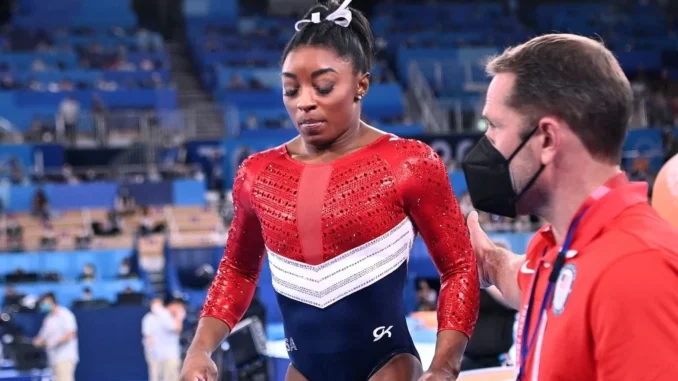
Reigning Olympic champion Biles says she had ‘a little bit of the twisties’ after pulling out of second event ‘It’s really scary because when you’re doing a skill like Simone does … it’s really dangerous,’ says former UCLA gymnast The words send shivers up the spine of nearly every gymnast – the twisties.
It’s the mental block that causes gymnasts, even those at the top of their game like US superstar Simone Biles, to lose control of their bodies while mid-air.
Biles, who cited mental health concerns after withdrawing from the women’s gymnastics team final and Thursday’s individual all-around final, mentioned getting “the twisties” during a vault that served as her only routine of the final team competition. Seeing the nearly unflappable Biles falter was shocking to many, but for those who have experienced the alarming sensation of their bodies disconnecting from their minds while upside down, it also brought up bad memories. “It’s kind of like forgetting how to twist your body in the air,” former UCLA gymnast JaNay Honest said. “It’s really scary because when you’re doing a skill like Simone does … it’s really dangerous.”
In other sports, it might be called “the yips”. Similar mental blocks suddenly stop pitchers from getting the ball across home plate or keep basketball players from making free throws. But if a gymnast gets the twisties, the ramifications could be much worse than a missed shot or scorecard error. “In our sport, we essentially dive into a pool [with] no water,” former Olympic gold medallist Dominique Moceanu tweeted. “When you lose your ability to find the ground – which appears to be part of [Biles’] decision – the consequences can be catastrophic. She made the right decision for the team and herself.”
Biles pulled out of the team final after competing on vault, where she was scheduled to perform 2.5 twists in the air but scored a 13.766 after completing just 1.5 twists. Her score, which counted toward the team’s total, was more than a point lower than her qualifying score on the event. Without Biles, Team USA rallied to secure a silver medal.
On vault, Biles flared her arms out and opened her twist early before landing in a deep squat. But as former Olympian Laurie Hernandez pointed out on NBC’s Peacock stream, Biles’ head was still turned to the side when she landed, signalling that she wanted to keep twisting. The mixed signals indicated that Biles briefly lost where she was in the air. Afterwards, the 24-year-old was heard on the TV broadcast telling coaches she just didn’t trust herself. She withdrew from competition minutes later.
“There have been times where you walk into the gym and you’re not really in a good head space and you have to communicate to your coaches, ‘Look, I should not do gymnastics today’,” Honest said. “Because you just don’t feel safe.”

The sensation became so scary for Honest that she retooled her routines to focus more on flipping as opposed to twisting. But with Biles in the thick of Olympic competition, such drastic changes aren’t possible. Dismantling the mental block can be an arduous process. Oregon State gymnastics coach Tanya Chaplin said the team works with sports psychologists and its medical staff to coach gymnasts through the twisties. They question whether it’s the skill itself or outside forces and stress that compound the situation. “When the body isn’t in position to complete difficult skills, it’s important to get the mind trained on basics again,” said Honest, who is an analyst on Pac-12 Networks.
She used mental repetitions to help untwist her mind by imagining herself completing perfect skills over and over. When her mind was ready, then she could work physically by retraining skills into foam pits or on additional mats. “To me, gymnastics is 10 per cent physical,” Honest said, “and 90 per cent mental.” The twisties are a real and terrifying challenge for gymnasts. Simone Biles’ experience at the Tokyo Olympics highlighted the need for understanding both the physical and mental struggles athletes face. Whether you’re an aspiring gymnast or a sports fan, recognizing the importance of mental health in athletics is crucial.